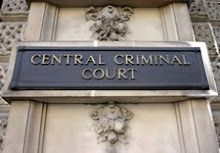OBITUARY FOR HH ROBERT LYMBERY
His Honour Robert Lymbery
Judge who presided over some of the country's biggest criminal trials in 32 years on the bench
Daily Telegraph online 12 Nov 2008
His Honour Robert Lymbery, who died on October 13 aged 87, dispensed justice with outstanding impartiality and consistent soundness. As Common Serjeant in the City of London, the second most senior judge at the Old Bailey, Lymbery presided over some of the country's biggest criminal trials. He served for almost 32 years on the bench, an almost unprecedented span, and virtually everyone who came before him went away feeling that they had had a fair hearing.
One of the most notorious villains to be tried by him was Valerio Viccei, the Ferrari-driving mastermind of the £40 million safe deposit robbery in Knightsbridge in 1987, one of Britain's biggest robberies. The haul was so large that Viccei filled his bath with banknotes and covered the floor of his Hampstead flat with jewels. Lymbery sentenced him to 22 years' imprisonment – but Viccei later felt moved to write to the judge thanking him for his exemplary conduct of the trial.
Lymbery's judgments scarcely ever gave rise to controversy. An exception, however, was his decision to grant bail to Winston Silcott, who was subsequently convicted of the murder, while he was on bail, of Pc Keith Blakelock during the Broadwater Farm riots.
At the time that he was bailed by Lymbery, Silcott had been on remand for a previous murder, of which he was subsequently convicted. At the committal stage, however, the prosecution case looked very weak; and the Lord Chancellor, Lord Hailsham, who was too much of a politician easily to exonerate a judge, later defended Lymbery's decision on bail as having been "entirely proper" in the circumstances.
For his own part, Lymbery said: "Like everyone else in the country, I am desperately saddened by the whole thing. But one is a professional and has to act accordingly." (Silcott's conviction for the murder of Pc Blakelock was eventually overturned on appeal in 1991, but he remained in prison for the other murder – of which he continues to protest his innocence – until 2003.)
Robert Davison Lymbery was born on November 14 1920 in Nottingham, where his family owned a lace manufacturing business and a large laundry. After Gresham's in Norfolk, where he excelled at rugby and hockey, he went up to Pembroke College, Cambridge, to read Law, shortly before the outbreak of the Second World War.
In 1940 he was commissioned into the 17th/21st Lancers and he subsequently saw action as a tank commander with the Eighth Army in North Africa, Sicily, Italy and Greece. Demobbed in 1946 in the rank of major, he returned to Cambridge, where he became a member of Hawks' Club and after two years graduated with a First.
After reading for the Bar he was called by Middle Temple in 1949 as a Harmsworth Scholar. He joined the chambers of Richard Elwes, QC, in King's Bench Walk, sharing a room with Geoffrey Lane, the future Lord Chief Justice, and set about building a predominantly criminal practice on the Midland Circuit. He took Silk in 1967.
His first judicial appointment was as Recorder of Grantham in 1965. He served as chairman of the Rutland Quarter Sessions from 1966 until 1971 and of the Bedford Quarter Sessions from 1969 to 1970. He was Commissioner of Assize in 1971, and the same year became a circuit judge, initially sitting at Bedford. He transferred to the Old Bailey in 1982.
Among his first defendants at Bedford was a self-styled white witch, who had stolen an altar cross and candlesticks from a church. Lymbery gave the woman a suspended prison sentence but advised her to look into her crystal ball to see what would happen if she broke the law again. "In case it is cloudy," he said, "I will tell you. You will go to prison."
In 1975 Lymbery inspired a Giles cartoon in the Daily Express when he heard an appeal against a decision by magistrates that a 12-stone Great Dane called Caliph was dangerous and should be destroyed. The dog had savaged a goat and then kept at bay a boy who had gone to the scene.
Lymbery, in wig and gown and accompanied by court officials, went to cast a judicial eye over the dog in the anteroom. After patting the dog on the head, he bravely put his hand to Caliph's mouth to examine his teeth and was promptly bitten.
Nothing daunted, he returned to the courtroom and reprieved the dog, saying: "What I did was my fault, which is why I am not complaining... I don't blame the dog in any way, he seemed a terribly friendly character." He then went to hospital for stitches and an anti-tetanus injection.
Bob Lymbery was a devoted and extremely conscientious lawyer. Whenever there was an opportunity to save time, he was inclined to seize it.
Occasionally, after a legal dinner, the black Daimler taking Lord Lane and his friends home would appear to break down on the motorway, and glide to a stop on the hard shoulder beneath a bridge, enabling Lymbery to get out, clamber up the embankment and walk to his house 200 yards away.
Away from the law, his main interest was gardening. A courteous, quietly spoken, almost diffident man, both on the bench and off it, he was none the less also gregarious and was excellent company. He had a keen sense of humour and enjoyed practical jokes and dressing up. As Common Serjeant in the Lord Mayor's procession, he once took a puppet along with him to entertain the crowd.
He married, in 1952, Anne Tuckett, who survives him with their three daughters.

No comments:
Post a Comment